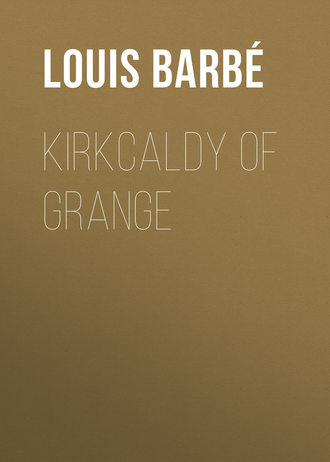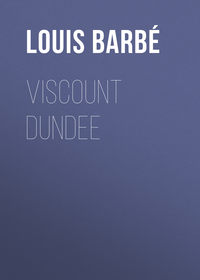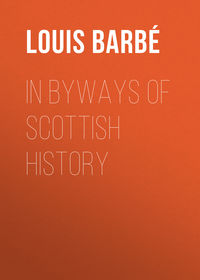 полная версия
полная версияKirkcaldy of Grange
From the moment that Grange and Lethington surrendered as prisoners to the English, Morton resolved that their lives should pay the penalty of their open defiance of his authority, and he did not hesitate to declare that he thought them ‘fitter for God than for this world, for sundry considerations.’ He accordingly demanded that they should be given over to him; and after some hesitation real or pretended, Elizabeth granted his request. Whilst she still seemed to be wavering the two prisoners wrote the following appeal to Burghley: —
‘My Lord, – The malice of our enemies is the more increased against us, that they have seen us rendered in the Queen’s Majesty’s will, and now to seek refuge at her highness’s hands. And, therefore, we doubt not but they will go about by all means possible to procure mischief; yea, that their cruel minds shall lead them to that impudency to crave our bloods at her Majesty’s hands. But whatsoever their malice be, we cannot fear that it shall take success; knowing with how gracious a Princess we have to do, which hath given so many good proofs to the world of her clemency and mild nature, that we cannot mistrust that the first example of the contrary shall be shewn upon us. We take this to be her very natural, Parcere subjectis, et debellare superbos.
‘We have rendered ourselves to her Majesty, which to our own countrymen we would never have done, for no extremity that might have come. We trust her Majesty will not put us out of her hands to make any others, especially our mortal enemy, our masters. If it will please her Majesty to extend her most gracious clemency towards us, she may be as assured to have us as perpetually at her devotion as any of this nation, yea, as any subject of her own; for now with honour we may oblige ourselves to her Majesty farther than before we might, and her Majesty’s benefit will bind us perpetually. In the case we are in, we must confess we are of small value; yet may her Majesty put us in ease, that perhaps hereafter we will be able to serve her Majesty’s turn, which occasion being offered, assuredly there shall be no inlack of good-will. Your Lordship knoweth already what our request is; we pray your Lordship to further it. There was never time wherein your Lordship’s friendship might stand us in such stead. As we have oftentimes heretofore tasted thereof, so we humbly pray you let it not inlack us now, in time of this our great misery, when we have more need than ever we had. Whatsoever our deservings have been, forget not your own good natural. If, by your Lordship’s mediation, her Majesty conserve us, your Lordship shall have us perpetually bound to do you service.
‘Let not the misreports of our enemies prevail against us. When we are in her Majesty’s hands she may make us what pleaseth her.
‘From Edinburgh, the 1st June 1573.’
The petition was unheeded. A few days later Drury was instructed to hand over his prisoners to the Regent. In the meantime Maitland had died, – it is difficult to determine whether it was from natural causes or ‘after the old Roman fashion, to prevent his coming to the shambles’ – and Grange was left to bear the brunt of Morton’s revenge.
On the 3rd of August, Sir William Kirkcaldy and his brother James, together with Morsman and Cockie, the two goldsmiths who had coined money in the Queen’s name, were brought to trial and condemned to death. Between the passing of the sentence and its execution in the afternoon of the same day, a final and frantic effort was made to save the Laird of Grange. Five score gentlemen, – kinsmen, friends, and well-wishers, – the least of them having heritage worth five hundred marks Scots a year, offered to become servants, themselves and their offspring, perpetually, to the houses of Angus and Morton, by giving their bond of man-rent; and, in addition to that, to pay twenty pounds annually, for more thraldom. They further promised to hand over twenty thousand pounds to the Regent, before the following Michaelmas, and to restore twenty thousand pounds of the Queen’s jewels that were in sundry hands. But Morton was under the influence of a power greater than even his own avarice. The offers, he admitted to Burghley, were as large as could possibly have been made; yet, he added, ‘considering what has been, and is, daily spoken by the preachers, that God’s plague will not cease till the land be purged of blood, and having regard that such as are interested by the death of their friends, the destruction of their houses, and the away-taking of their goods, could not be satisfied by any offer made to me in particular, I deliberated to let justice proceed.’
It was through David Lindsay, the minister of Leith, who visited Kirkcaldy after the trial, that this last appeal for mercy was made. When he returned with a stern refusal the condemned man said to him: ‘Mr David, for our old friendship and for Christ’s sake leave me not.’ A little later, when he saw the scaffold prepared at the Cross, the day fair and the sun shining brightly, so marked a change came over him that Lindsay, noticing it, inquired what affected him. ‘Faith, Mr David,’ replied he, ‘I perceive well now that Mr Knox was the true servant of God, and that his threatenings are accomplished.’ He then desired Lindsay to repeat Knox’s words. The minister did so, adding that Knox had told him that he had been earnest with God for Grange; that he was sorry for what should befall his body for the love he bore him; but that he was assured there was mercy for his soul. Kirkcaldy seemed much comforted and encouraged by this. As the fatal hour drew near he begged Lindsay to accompany him to the scaffold: ‘I hope in God, that after men shall think I am passed and gone, I shall give you a token of the assurance of that mercy to my soul according to the speech of that man of God.’
In the afternoon the Laird of Grange, and Morsman, who was to be executed with him – James Kirkcaldy and Cockie were to be hanged later in the day – were drawn backwards from their prison to the gibbet. It was about four o’clock, ‘the sun being west, about the north-west corner of the steeple, when Sir William was thrust off the ladder. As he was hanging, his face was set toward the east; but within a prettie space turned about to the west against the sun, and so remained; at which time Mr David marked him, when all supposed he was dead, to lift up his hands which were bound before him, and to lay them down again softlie; which moved him with exclamation to glorify God before all the people.’
Of the man who thus ended his eventful life, his contemporary Melville has written: ‘He was humble, gentle, and meek, like a lamb in the house, but like a lion in the fields. He was a lusty, strong, and well-proportioned personage, hardy, and of a magnanimous courage, secret and prudent in all his enterprises, so that never one that he made or devised misgave, where he was present himself. When he was victorious he was very merciful, and naturally liberal, an enemy to greediness and ambition, and a friend to all men in adversity. He fell frequently in trouble in protecting innocent men from such as would oppress them, so that these his worthy qualifications were also partly causes and means of his wreck; for they promoted him so, in the opinion of many, that some loved him for his religion, uprightness, and manliness; others, again, depended upon him for his good fortune and apparent promotion, whereby divers of them hoped to be advanced and rewarded, supposing that offices and honours could not fail to fall to him. All which he wanted through his own default; for he had fled from avarice, and abhorred ambition, and refused sundry great offices even to be Regent, which were in his offer as well as other great benefices and pensions. Thus wanting place and subsistence to reward he was soon abandoned by his greedy and ambitious defenders: for when they saw him at a strait, they drew to others, whom they perceived to aim at more profitable marks. On the other hand, he was as much envied by those who were of a vile and unworthy nature, of whom many have made tragical ends for their too great avarice and ambition, as shortly after did the Earl of Morton. This gallant gentleman perished for being too little ambitious and greedy.’
Nothing that has been recorded in these pages contradicts Melville’s eulogy. And posterity may be content to adopt his estimate of the character of an honourable man, a brave soldier, and a sincere patriot.
The End1
Sent back.
2
If any troubles should arise.
3
Worthy.
4
Without equal in this kingdom.
5
For I have men and meat enough,They know I am a fighter tough,And will be right soon grieved;When they have lost as many teeth,As they did at the siege of Leith,They will be fain to leave it.Then who, I pray you, shall be boundTheir losses to make good?Or give such compositionAs they got then of France?Thus blinded, beguiled,They will but get a cheat;Come they here, these two yearsThey shall not miss their thrashing.6
clamour.
7
afraid.



